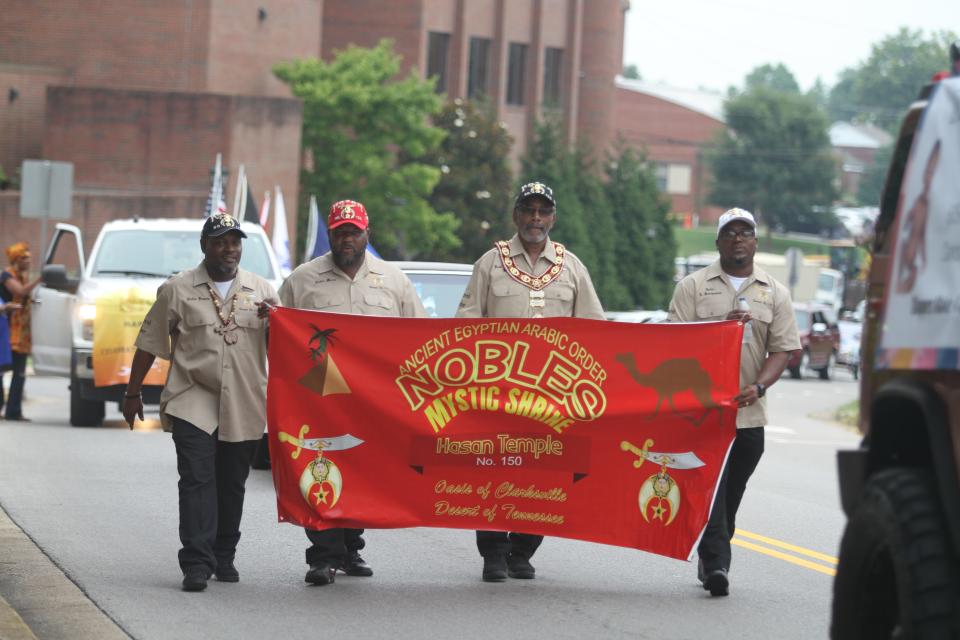How voters can abolish slavery forever in Tennessee this November | Opinion
According to the Tennessee Constitution, slavery is legal in Tennessee.
On Aug. 8, 1863, in Greeneville, Tennessee – over eight months after President Abraham Lincoln signed the Emancipation Proclamation – Gov. Andrew Johnson freed the people he enslaved, including his biological children.
Aug. 8th thereafter became known as Emancipation Day and has been celebrated, especially in East Tennessee communities, for over 150 years. Yet in 2022, slavery is legal in Tennessee.
The language regarding slavery in the Tennessee Constitution adopted in 1870, largely drew from the 13th Amendment to the Constitution of the United States of America.
Article I, Section 33 of Tennessee’s Constitution reads: “That slavery and involuntary servitude, except as a punishment for crime, whereof the party shall have been duly convicted, are forever prohibited in this State.”
Thus, an old form of enslavement of Black people transformed into a new shifting system that adapted over time to exploit this loophole. From convict leasing, to the Black Codes, to chain gangs, to Jim Crow, to today’s mass incarceration, this caveat has allowed for the fundamental continuation of enslavement in changing forms.
To this day, for all those who have been convicted of a crime – regardless of race – slavery is still perfectly legal in the state of Tennessee.
More: America is still trying to figure out how to frame the journey of descendants of its enslaved
Hear more Tennessee Voices: Get the weekly opinion newsletter for insightful and thought provoking columns.
Vote to amend the state Constitution
This November, we have the opportunity to abolish slavery for everyone.
A "yes" vote for Amendment 3 supports amending the Tennessee State Constitution – the highest law of our state – to remove language that allows the use of slavery and involuntary servitude as punishment so that instead "Slavery and involuntary servitude are forever prohibited."
Currently, there are 19 states with constitutions that definitively permit either slavery, involuntary servitude, or both as punishment for “crime."
These constitutional provisions were originally added to state constitutions during the Civil War and the attempt at Reconstruction.
In order for Tennessee voters to get the option to vote yes for Amendment 3 to abolish slavery for all people, a voter must first place their vote for a governor.

Sign up for Latino Tennessee Voices newsletter: Read compelling stories for and with the Latino community in Tennessee.
Sign up for Black Tennessee Voices newsletter: Read compelling columns by Black writers from across Tennessee.

Your state. Your stories. Support more reporting like this.
A subscription gives you unlimited access to stories across Tennessee that make a difference in your life and the lives of those around you. Click here to become a subscriber.
Incarceration is another form of enslavement
Amendment 3 is not symbolic. slavery actually exists.
Author Douglas A. Blackmon famously coined a description of post-slavery criminalization and exploitation as “slavery by another name.”

Similarly, incarceration in many ways replicates another form of enslavement. Whether through the destruction of familial bonds by separation of children from their parents, or through the voter disenfranchisement of incarcerated and formerly incarcerated people, or through the rampant violence of sexual assault and rape, both the pre-20th century chattel slavery, and its new iteration of mass incarceration, destroys the fabric of our beloved communities.
In particular, the appallingly low wages for incarcerated workers mirrors the exploitation of enslaved people’s labor. Incarcerated people in Tennessee work for as low as 17 cents per hour.
Upon release, many of us are subject to wage slavery, having marginal employment due to discrimination from having a felony on our background. Without a doubt, our experience demonstrates the very real and detrimental impact that legalized slavery has on everyone in Tennessee.
Stand for liberty, not for slavery
Either you believe there should be slavery, or you do not. As we get ready to celebrate this year’s August 8th Emancipation Day with events all across the state, we must come together and finish the struggle to abolish slavery for all people.

The possibilities for the future of Tennessee are endless when slavery is no longer a legal form of punishment.
As Tennesseans we must make the hard stance that we stand for liberty not slavery. We believe in family, community, and integrity. We do not believe that people should be enslaved.
If you believe there should not be slavery, then it is your duty to answer this call to action. Get involved in the campaign to end slavery in Tennessee, and this November, vote yes on Amendment 3.
Dawn R. Harrington of Jackson, Tennessee is executive director of and Jan Blair of Johnson City, Tennessee is a trainer at Free Hearts, an organization led by formerly incarcerated women that provides support, education, and advocacy in organizing families impacted by incarceration, with the ultimate goals of reuniting families and keeping families together
This article originally appeared on Nashville Tennessean: Tennessee general election: Amendment 3 will abolish slavery forever

